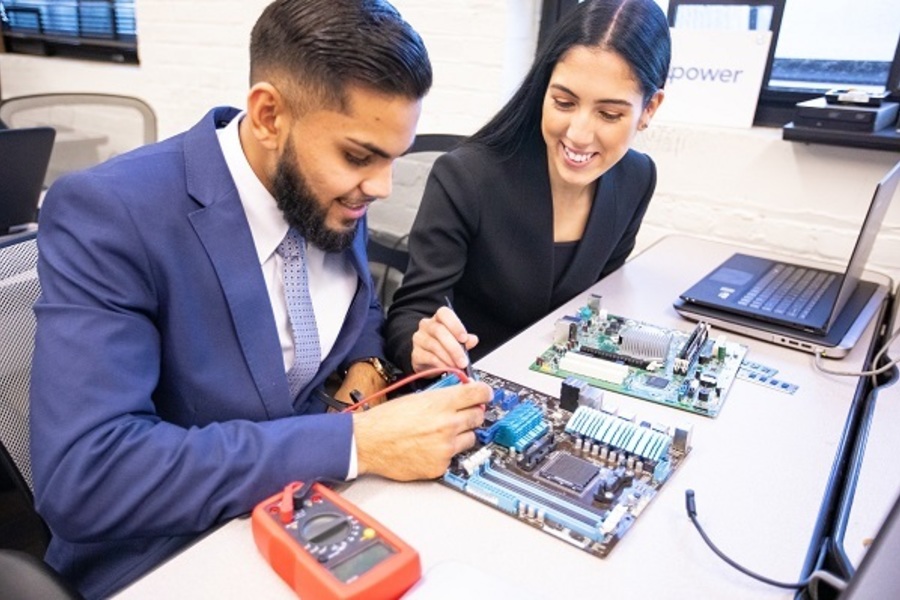NPower

Locations
- NPower - Dallas, Texas
- NPower - Harlem, New York
Focus Areas
- Economic Mobility
- Education
“The digital divide is real. There’s a real divide between communities with resources and those without. You can’t even apply for a job today without having access to the internet and knowing how to use a keyboard.”
The Issue
The financial crisis of 2008 hit low-income families hard. With massive layoffs and fewer job opportunities, unemployment became a major obstacle to self-sufficiency. While overall employment has improved steadily since 2008, not every American has experienced the same gains. Veterans and youth between the ages of 18 and 24 still have a hard time finding meaningful work. And today, challenges to employment become challenges to secure, self-sustaining futures.
In 2019, the Bureau of Labor Statistics reported that 9% of the young men and 8% of the young women looking for work were unemployed. These numbers only worsen for minority groups. That same year, 11% of Hispanic youth and 15% of Black youth faced unemployment. And veterans face similar challenges. Highly specialized skill sets, stereotypes, and the possibility of deployment keep employers from offering opportunities to vets. Because vets and youth from disinvested communities are already more likely to be in poverty, these challenges can prevent them from living independent, self-sufficient lives.
It’s not a secret that job opportunities are critical for vets, young people, and their families. Take low-income youth: Any income they earn can significantly lessen their family’s financial burdens, whether by paying for groceries or helping to pay down a mortgage. Even more importantly, research finds that early work experience is foundational to professional development. Life with a job helps young people develop the skills they need to launch and sustain meaningful careers. It increases self-esteem and reduces the likelihood they’re involved in crime. It’s also a strong predictor of future earnings. And vets? Stable work not only allows them to provide for their families, but it helps them transition smoothly into civilian life. After all of their sacrifices, we owe them this.
Today, veterans and low-income youth are often directed toward traditional education. And while education is a gateway to higher-paying jobs and stable careers, not everyone has the opportunity to attend a four-year college. In 2018, only 28% of veterans had completed their college education. The same year, 43% of young people–16 million youth–were not enrolled in school. Without the clout of a college degree, many vets and young people are left to find opportunities on their own. And many of those don’t exist.
But today’s tech economy is a major opportunity. The tech industry offers high-paying jobs for high-skill workers, and many of these skills can be taught outside of the university. Veterans and youth also have the work ethic, resiliency, and experience needed to become powerful leaders and effective teammates. Developing their skills and connecting them with job opportunities is a way to tap into their strengths and enhance our workforce. It’s an opportunity to end poverty. Still, past research on the effectiveness of job-training programs shows mixed results. To give youth and veterans the chance to break out of poverty’s vicious cycle, we need more research into the kinds of programs that help them find gainful employment. Because they’re an incredible asset, and their futures depend on it.
The Intervention
Through job training and placement, NPower works with opportunity youth and veterans to create career pathways into the information technology industry. NPower’s Tech Fundamentals program is an intensive 23-week crash course that helps participants gain full-time employment in an information technology career. Over the first 16 weeks, students attend a tuition-free course that helps them earn industry-recognized certifications. Following, they are immersed in the professional scene and receive a 7-week paid internship with one of NPower’s corporate partners. After completing their internship, students graduate from NPower and receive ongoing job-placement assistance.
Research Question
Does participation in NPower’s Tech Fundamentals course increase students’ labor market outcomes and level of educational attainment?
Intended Outcomes
- Low-income youth and veterans who participate in NPower’s Tech Fundamentals program will have higher future earnings and more stable employment than those who do not.
- NPower graduates will achieve higher levels of post-secondary education than non-participants, measured by college enrollment and earned industry certifications.
Research Study Design
The NPower study is a randomized controlled trial. To measure the impact of NPower’s Tech Fundamentals program on the labor market and educational outcomes of participants, eligible applicants are entered into a lottery to receive a limited number of interview slots. This fairly decides who will continue on in the application process. Of the individuals selected by the lottery, those who pass the interview process are enrolled into NPower’s Tech Fundamentals course. Individuals not selected by the lottery are not invited to continue on in the application process.
Because students who apply to the Tech Fundamentals course may be particularly motivated to pursue further education, this research design helps to ensure we are comparing similar kinds of students across the treatment and control groups. In the years following their application to NPower, LEO researchers will compare the earnings and employment outcomes of those in the treatment and control groups. LEO researchers will also compare rates of college enrollment and completion across groups.
(Photo credit: NPower, Inc.)